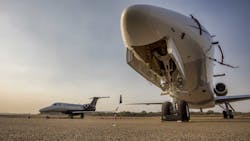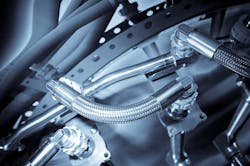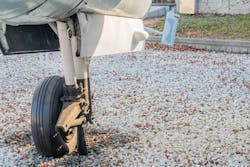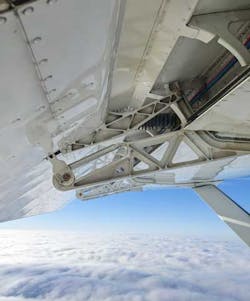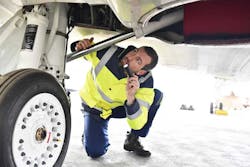The Vital Role of Hydraulic Systems in Aircraft
Hydraulic systems play a crucial role in the aviation industry. They provide the power to operate various functions, from raising and lowering landing gear to operating flaps and brakes.
Proper design and maintenance of aircraft hydraulic systems make it is possible to perform many of the critical functions required for safe and efficient flight.
Proper Hydraulic Fluid Choice is Crucial
Hydraulic systems use hydraulic fluid to transmit power from the aircraft's engines to its components. The fluid is pressurized and directed through hoses and pipes to actuate various aircraft systems.
There are various fluid types which can be used for hydraulic systems in airplanes, such as mineral oil, which have an array of properties that impact system performance, such as viscosity and boiling point. Therefore, selecting the correct hydraulic fluid is crucial for optimal performance and longevity of aircraft hydraulic systems.
Hydraulics Benefit Safe Landing
One of the most critical functions of hydraulic systems in aircraft is to raise and lower the landing gear. The landing gear is a complex and heavy system requiring significant power.
Hydraulic systems provide this power, allowing the landing gear to be raised and lowered quickly and efficiently. Without this function, performing a safe and successful landing would be impossible.
Improving the Safety of the Aircraft
Airplane hydraulic systems also operate other critical components on the vessel. These include flaps, which adjust the lift and drag of an aircraft during takeoff and landing, and brakes, which slow down the plane during landing. The hydraulic system’s ability to operate these critical systems with high precision is essential for the aircraft's safety and efficiency.
Another advantage of hydraulic systems in aircraft is their ability to operate reliably in extreme conditions, such as high altitudes, low temperatures and challenging environments. Highly efficient systems reduce the aircraft's overall weight and fuel consumption.
Additionally, hydraulic systems are exact, enabling accurate and precise movements of an aircraft's components.
The Importance of Aircraft Hydraulic System Maintenance
Hydraulic systems in airplanes also require regular maintenance to prevent leaks and ensure optimal performance. Failure to maintain the system can lead to catastrophic failure, which can be costly and dangerous. Also, hydraulic systems can be heavy and complex, increasing the aircraft's weight and cost.
In the 1950s, hydraulic leaks occurred approximately every 17.5 hours of flight time in a military aircraft. While in the 1960s, they were reduced to every 23.8 hours. And from 1980 through 1996, they were further reduced to every 50 hours of flight. Leakage frequency was cut because of advancements in sealing and fitting technology.
In conclusion, aircraft hydraulic systems are a crucial part of modern aircraft, providing the power and precision necessary to perform various functions. The system's ability to operate the landing gear, flaps and brakes is critical for safe takeoff and landing. In addition, selecting the correct hydraulic fluid and regular maintenance is crucial for optimal performance and longevity.
Despite a few limitations, hydraulic systems in aircraft will continue to play a vital role in the aviation industry for years. Their ability to operate reliably in extreme conditions with high efficiency and precision is essential for safe and efficient flight. As technology advances, hydraulic systems will continue to evolve, improving their reliability and efficiency and making air travel safer and more efficient for passengers and crew.
